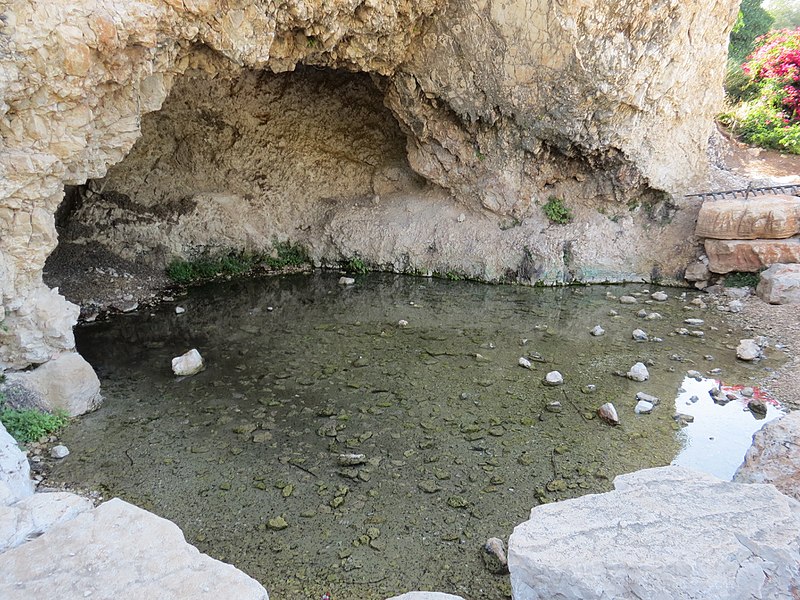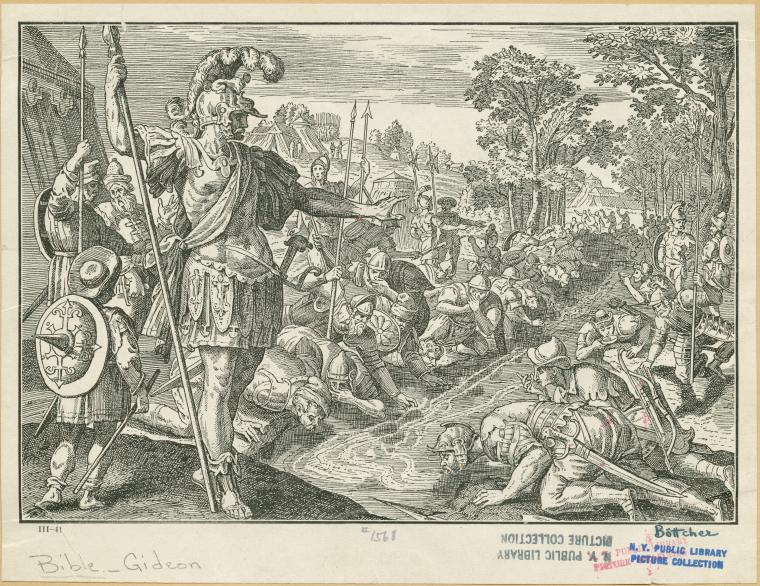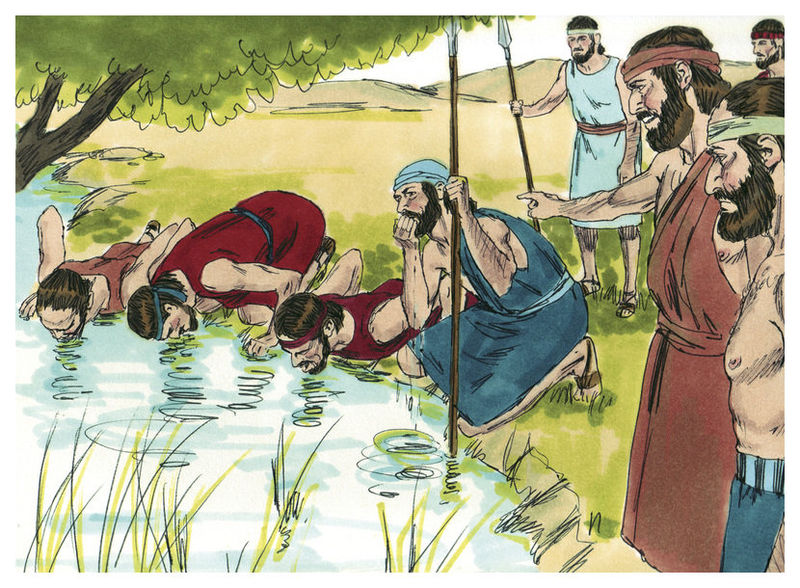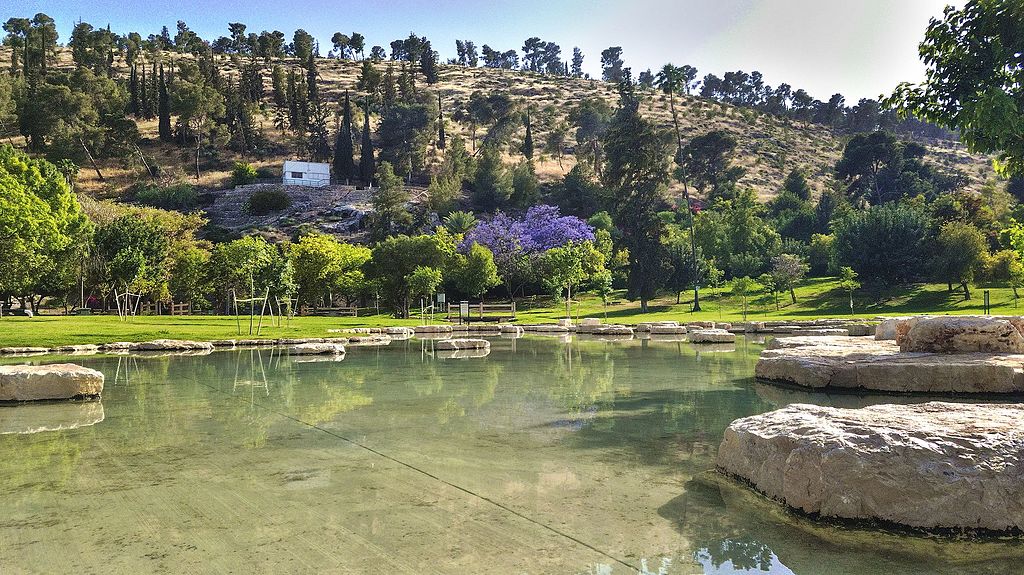Welcome back to the Holy Land Studies blog after a long hiatus! In today’s post we will take a closer look at the famous story of Gideon and the 300 Lappers. This certainly one of the most curious and misunderstood episodes in the Hebrew Bible. In chapter 7 of the Book of Judges, the Lord instructs Gideon to reduce his massive army to an elite group of only 300 soldiers by means of a strange water drinking test. Why does Gideon need to get rid of so many soldiers? What possible connection could there be between the way that a soldier drinks and his combat abilities?
First some background…What exactly does the word judge refer to? In the Book of Judges, the word “judge” (shofet שׁוֹפֵט) is not a magistrate or a judicial officer who sits in a court of law. Rather, this refers to a warrior whose victories over Israel’s enemies are deemed divinely mandated “justice”. The Period of the Judges was an interlude of approximately two centuries beginning with the conquest of the Land by Joshua (1200 BCE) and ending with the enthronement of the first king of Israel, Saul (1050 BCE). This was an era marked by anarchy and disunity, as the Israelites had not yet dominated all the indigenous Canaanite tribes and authority was not centralized. The Bible clearly expresses a negative assessment of this period: “In those days there was no king in Israel; all the people did what was right in their own eyes.” (Judges 17:6) Because there was no central authority, leadership sprung up episodically in the form of local chieftains known as judges including: Othniel, Ehud, Deborah, Barak, Gideon, Abimelech, Jephthah and Samson.
 The Harod Sping at the foot of Mount Gilboa in northern Israel, where Gideon tested his soldiers.
The Harod Sping at the foot of Mount Gilboa in northern Israel, where Gideon tested his soldiers.
In chapters 6-8 of the Book of Judges, we read the story of Gideon combating the Midianites and Amalekites, two Transjordanian tribes who routinely crossed the Jordan River to raid the northern tribes of Israel. An angel appears to Gideon and appoints him savior. Gideon then proceeds to assemble an army, but he has far too many soldiers. God instructs him that he must reduce the number of soldiers in order to emphasize that the military victory is a purely divine miracle: “You have too many men. I cannot deliver Midian into their hands, or Israel would boast against me, ‘My own strength has saved me’” Judges 7:2. First Gideon reduces his army from 32,000 to 10,000, but this is still too many people. Next he takes his army to the Harod Spring (pictured above) and gives them an odd drinking test to further reduce the army to a core group of 300 elite fighters. Here is the passage which describes the test:
So Gideon took the men down to the water. There the Lord told him, “Separate those who lap the water with their tongues as a dog laps from those who kneel down to drink.” Three hundred of them drank from cupped hands, lapping like dogs. All the rest got down on their knees to drink.” Judges 7:5-6 NIV
It is clear that there are two groups of men: (1) the “lappers” and (2) the “kneelers.” The smaller group of 300 “lappers” are chosen to remain while the larger group of 9700 “kneelers” are sent home. But the exact details of how each group’s drinking style differs are quite confusing. We tend to picture the “lappers” lying on their bellies with their tongues in the water drinking boorishly like dogs, whereas the “kneelers” are genuflecting down on one knee politely using their hands as a cup. According to this interpretation, Gideon favored the “lappers” because they were less civilized, more animalistic and perhaps even less intelligent than the “kneelers”, and thus the opportunity for God to magnify his role in the victory becomes all the greater. This is certainly the interpretation found in the following two illustrations.
 Böttcher, Christian Eduard – Gideon selects his army of 300 by observing their manner of drinking from a stream – 1908
Böttcher, Christian Eduard – Gideon selects his army of 300 by observing their manner of drinking from a stream – 1908
 Distant Shores Media/Sweet Publishing
Distant Shores Media/Sweet Publishing
If this is the case, then in verse 6 why does the New International Version describe the chosen group of 300 as “drinking from cupped hands, lapping like dogs”? This is a faithful translation of the Hebrew phrase הַמְלַקְקִים בְּיָדָם אֶל-פִּיהֶם which literally means “those who lapped, putting their hand to their mouth”. The Hebrew word for “lapping” melakekim comes from the root LKK, which like the English word “lick” is a nice example of onomatopoeia. The same verb is only used in one other story in the Bible, describing the dogs “licking up” the blood of wicked King Ahab in 1 Kings 21-22. In this verse, the NIV translation has decided to apply the phrase “drinking from cupped hands” to the “lappers” just as the original Masoretic Hebrew text does. Let’s take a look at another translation:
So he brought the troops down to the water; and the Lord said to Gideon, “All those who lap the water with their tongues, as a dog laps, you shall put to one side; all those who kneel down to drink, putting their hands to their mouths, you shall put to the other side.” The number of those that lapped was three hundred; but all the rest of the troops knelt down to drink water. Judges 7:5-6 NRSV
Here the chosen group of 300 is described as “lappers” but not “drinking from cupped hands.” What is going on here? The New Revised Standard Version has emended verse 6, moving the phrase “putting their hands to their mouths” earlier to verse 5. This is based on an editorial decision that the Masoretic Hebrew text of verse 6 is corrupt, having been miscopied over the ages. This is a big change because according to NRSV the “kneelers” and not the “lappers” are the ones who use their hands to drink. How do we make sense of this contrast?
I would like to suggest a solution. Regardless of which translation you choose to follow, I think that the phrase “lap the water with their tongues as a dog laps” is not meant to be taken literally. The “lappers” are not actually drinking in the same way that dogs drink. They do not insert their mouths directly into the water, as this is very inefficient – even impossible – way for human beings to drink (try doing this without inhaling water through your nose!). Physiologically, humans do not have the ability to drink water exactly like a dog because their tongues function totally differently. A dog sticks his long tongue into a pool of water and curls it back and up to form a small cup. He then uses this “tongue cup” to scoop up a portion of water which is then flicked backwards into the mouth. Watch this amazing slow-motion video of the process. Human tongues simply cannot accomplish this feat, and the dog reference in verse 5 is therefore meant to be understood metaphorically. The “lappers” use a single cupped hand in the same way that a dog uses his tongue: to scoop up a portion of water and to flick it into their mouths quickly. Much water is lost in the process, but it is quick and easy. This would mean that the “lappers” are not lying on their bellies but rather crouching down, still standing on their feet. They remain alert and unexposed, which is crucial on the battlefield. The “kneelers,” by contrast, are fully prostrated, down on their knees beside the spring. They too drink by using their hands but in a different way: their two hands are joined to form a bowl from which they can comfortably sip. Although this is a better, less wasteful method of getting water into one’s mouth, the kneeling position leaves the soldier vulnerable to attack because he has his face to the ground. Gideon needed an elite force of 300 alert soldiers who would not endanger themselves by taking long water breaks. So insofar as they are dog-like, the “lappers” were not chosen because they were more vicious or vulgar than the “kneelers” but because they were less self-indulgent. Ultimately, however, the “lappers” were selected because they were the minority. From the outset, God indicates that he favors a small army of a few hundred instead of a few thousand to emphasize that the victory is due to divine providence, not human achievement.
 Today a large water park with several pools has been created in the vicinity of the original Harod Spring.
Today a large water park with several pools has been created in the vicinity of the original Harod Spring.






Thank you, I am doing a teaching on the whole armor of God, preparedness, position during war and Gods work with the smaller army so his glory can be magnified. This explaination was absolutely a blessing to me. Thank God, and thank you for your study time and interpetation.
Thank you for researching several versions and interpretations and clearly illustrating whats up
Agreed! This is how I have always understood and preached this passage – a soldiers survival ultimately depends upon their degree of alertness and quickness to respond to threats/attacks. Good article!
God did not call the qualified, He qualifies the called. Jonathan I hope to study with you. Please let me know how to directly engage with you. Thanks
According to Rashi (always your go to for explaining)“ Every one who laps with his tongue, etc., and (likewise) every one that kneels upon his knees to drink.”: Set him (i.e., he who kneels) separately away from your group because they will not go with you since they are thus accustomed to kneel before idols.
Kneeling was a way to separate out the idol worshipers, he only wanted the most righteous for this battle.
Thank you for clarifying for me the significance of the water lapping described in the book of judges. I always thought that this posture was showing disrespect as apposed to the soliders who kneeled to drink the water. It makes sense now. I can see Gods reasoning behind his selection. I appreciate your help. GBY
Thank you for
The Soldiers are the men and women of God who are constantly in the battlefield of this world, must be agile at all times like lappers, less wasteful because we are drinking from the river of Holy Spirit. Thanks for this message of truth
God only needs a Few Good Men…..
I’m so happy you are back. Looking forward to your posts.
This is very interesting. Honestly, I have never thought much about it. God used His own criteria to choose whom He wants in His army. But I like the way you explain and compare it to how a dog really drinks. You are also right that it doesn’t make sense for a human to lie down prostrate and lick with his tongue, we would not get much water into our mouth.
I think there is also an interesting theme in this story that runs throughout scripture. God often divides and elects someone or a group away from others for His own purpose. Often, we don’t know why or what the exact criteria is. God chose Seth, then He chose Noah, then Abraham, then Isaac, then Jacob… then He chose the Levites… and specifically Aarons family as priests… and here God chose a the group of lappers…
I have often pondered these verses:
Matthew 22, 14: “For many are called, but few are chosen.”
2 Peter 1,10: “Therefore, brothers, be all the more eager to make your calling and election sure. For if you practice these things you will never stumble.”
In the first verse it seems like we are chosen at random, some are and some are not. But the second verse shows that we need to work for our election. I love the example of Abraham: God called him, and he obeyed – so God chose him. I think it is the same in our lives, God has called us – if we obey His call, we can become part of His chosen.
Just like in the story of Gideon and the lappers, the exact characteristics of the soldiers that God wanted is not given – He uses His own criteria and standard. May we strive to discover what God wants from us and obey His voice, so that we can be part of His elect.
At this very moment (4:05am) I am sitting in a hospital room with my sister. She is sick, I’m just here keeping her company. The meds have knocked her out and I’m playing the game Bible Trivia on my phone. I came across a question that asked how many men were chosen from the water test. Forgive me, but I have never heard about the water test so I looked it up and read all about it. I really enjoyed what I learned. I quickly came up with ideas for a lesson plan using the water test in my youth class. Thank you for this page and thank you God for showing this page to me. I look forward to reading and learning more about this page. Amy Overman